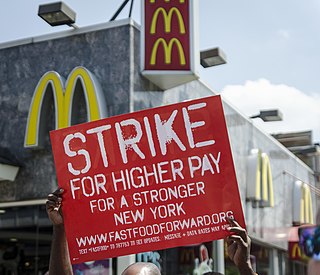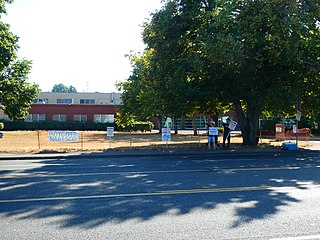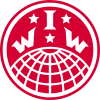Related Research Articles
Henry Loeb III was an American politician of the Democratic Party, who was mayor of Memphis, Tennessee for two separate terms in the 1960s, from 1960 through 1963, and 1968 through 1971. He gained national notoriety in his second term for his role in opposing the demands of striking sanitation workers in early 1968.

The Memphis sanitation strike began on February 12, 1968, in response to the deaths of sanitation workers Echol Cole and Robert Walker. The deaths served as a breaking point for more than 1,300 African American men from the Memphis Department of Public Works as they demanded higher wages, time and a half overtime, dues check-off, safety measures, and pay for the rainy days when they were told to go home. The Memphis sanitation strike was led by T.O. Jones and had the support of Jerry Wurf, president of the American Federation of State, County, and Municipal Employees (AFSCME) and the local branch of the National Association for the Advancement of Colored People (NAACP). The AFSCME was chartered in 1964 by the state, the city of Memphis refused to recognize it. Resulted in the second sanitation Worker Strike in 1968 which began because of several incidents that led the employees to strike. Mayor Henry Loeb refused to recognize the strike and rejected the City Council vote, insisting that only he possessed the power to recognize the union. The Memphis sanitation strike prompted Martin Luther King Jr.'s presence, where he famously gave the “I’ve Been to the Mountaintop” speech a day before his assassination.
The 1974 Baltimore municipal strike was a strike action undertaken by different groups of municipal workers in Baltimore, Maryland, United States. It was initiated by waste collectors seeking higher wages and better conditions. They were joined by sewer workers, zookeepers, prison guards, highway workers, recreation & parks workers, animal control workers, abandoned vehicles workers, and eventually by police officers. Trash piled up during the strike, and, especially with diminished police enforcement, many trash piles were set on fire. City jails were also a major site for unrest.
The St. Petersburg sanitation strike of 1968 was a labor strike by city sanitation workers in St. Petersburg, Florida that lasted an estimated four months. The strike of 1968 was one of three labor strikes that took place within three years by city sanitation workers, who cited grievances of pay inequality and poor working conditions. A wage dispute over a newly implemented 48-hour work week triggered the sanitation strike which lasted 116 days. 211 sanitation workers participated in the work stoppage, 210 of whom were African-American. The racial makeup of the strikers increased tensions surrounding the work stoppage and impaired social race relations in the city.

The Fight for $15 is an American political movement advocating for the minimum wage to be raised to $15 per hour. The federal minimum wage was last set at $7.25 per hour in 2009. The movement has involved strikes by child care, home healthcare, airport, gas station, convenience store, and fast food workers for increased wages and the right to form a labor union. The "Fight for $15" movement started in 2012, in response to workers' inability to cover their costs on such a low salary, as well as the stressful work conditions of many of the service jobs which pay the minimum wage.

United Voices of the World (UVW) is an independent grassroots trade union, established in 2014, with a reported membership of over 3,000.

The first presumptive case relating to the COVID-19 pandemic in Louisiana was announced on March 9, 2020. Since the first confirmed case, the outbreak grew particularly fast relative to other states and countries. As of February 8, 2021, there have been 411,812 cumulative COVID-19 cases and 9,119 deaths. Confirmed cases have appeared in all 64 parishes, though the New Orleans metro area alone has seen the majority of positive tests and deaths. Governor John Bel Edwards closed schools statewide on March 16, 2020, restricted most businesses to takeout and delivery only, postponed presidential primaries, and placed limitations on large gatherings. On March 23, Edwards enacted a statewide stay-at-home order to encourage social distancing, and President Donald Trump issued a major disaster declaration, the fourth state to receive one.

Strikes occurred during the COVID-19 pandemic due to many factors including: hazard pay or low pay, unsafe working conditions, inability to pay rent. These strikes are separate from the various protests that occurred over responses to the pandemic.
The Atlanta sanitation strike of 1977 was a labor strike involving sanitation workers in Atlanta, Georgia, United States. Precipitated by wildcat action in January, on March 28 the local chapter of the American Federation of State, County and Municipal Employees (AFSCME) agreed to strike. The main goal of the strike was a $0.50 hourly wage increase. With support from many community groups, Atlanta mayor Maynard Jackson resisted the strike, firing over 900 striking workers on April 1. By April 16, many of the striking workers had returned to their previous jobs, and by April 29 the strike was officially ended.

The 2020 Michigan graduate students strike was a labor strike launched by the Graduate Employees' Organization, the graduate student employee union that represents approximately 2,100 graduate student instructors at the University of Michigan in Ann Arbor, Michigan, United States. The main cause of the strike was related to graduate students' objection to the university's plans for reopening during the COVID-19 pandemic. Additional calls were made by the union for defunding the campus police. The strike started on September 8, 2020 and was scheduled to last for four days, with a subsequent vote extending the strike for another week. Following the start of the strike, resident assistants and student employees for the university's dining services announced they would also strike over similar concerns regarding the university's COVID-19 policies.
The 2018 Atlanta sanitation strike was a labor strike involving 120 sanitation workers for Republic Services in Atlanta, Georgia, United States. The workers, members of the International Brotherhood of Teamsters, went on strike on August 10, 2018, with the strike ending later that day. Several days later, the union and company reached an agreement on new labor contracts.
The 2021 Hunts Point Produce Market strike was a labor strike involving workers for Hunts Point Produce Market in the Hunts Point neighborhood of the Bronx, New York City. The strike was carried out by about 1,400 members of Teamsters Local 202, all "produce handlers and delivery drivers" according to The Wall Street Journal. An agreement to end the strike was reached on January 23, 2021.
The 2020 University of Illinois Hospital strikes were the result of a breakdown in contract negotiations between labor unions and hospital management over salaries, staffing levels, and access to personal protective equipment.
The 2021 St. Charles Bend strike was a labor strike involving technical workers at the St. Charles Medical Center – Bend in Bend, Oregon, United States. The strike was precipitated when, in 2019, the workers at the hospital unionized with the Oregon Federation of Nurses and Health Professionals. Following this, the union's bargaining unit began to negotiate a labor contract between the workers and the hospital, with several dozen negotiating meetings following over the next year. By December 2020, however, both sides were at an impasse, and in February 2021, the union filed a strike notice. Despite legal challenges by the hospital, the strike commenced on March 4. On March 13, both sides agreed to a proposal by a federal mediator, with workers to return to work while both sides continued to negotiate a contract, with a deadline of March 31. The strike officially ended on March 15 and workers returned to the hospital. A contract was eventually ratified between the union and hospital by the end of that month.

The 2021 Warrior Met Coal strike is an ongoing labor strike in Alabama, United States. The strike began on April 1, 2021 and involves members of the United Mine Workers of America striking against Warrior Met Coal Inc. Warrior Met was formed after the bankruptcy of Walter Energy and operates coal mining facilities in the state. The strike is over the failure of the union and company to agree to a labor contract for the approximately 1,100 union members who work for Warrior Met.
The 2021 Frito-Lay strike was a labor strike by employees at the Topeka, Kansas Frito-Lay plant against the company's mandatory overtime policy. The strike began on July 5, 2021 and ended on July 23, 2021.

The 2021 Nabisco strike was a labor strike involving workers for the American snack manufacturer Nabisco, a subsidiary of Mondelez International. The strike began at a Nabisco facility in Portland, Oregon on August 10 and over the next few days spread to several more Nabisco facilities throughout the United States.
The 2021 Allegheny Technologies strike was a labor strike involving about 1,300 workers for metals manufacturing company Allegheny Technologies Incorporated (ATI), all unionized with the United Steelworkers (USW). The strike began on March 30 and ended on July 13 with the ratification of a new labor contract. Strikers returned to work by July 19.
The 2021 Virginia Volvo Trucks strike was a labor strike involving workers at a Volvo Trucks production facility in Dublin, Virginia, United States. The strike began in April and ended in July with the ratification of a new labor contract.
The 2021 Kellogg's strike is an ongoing labor strike that began on October 5 and involves about 1,400 workers for food manufacturer Kellogg's, unionized as members of the Bakery, Confectionery, Tobacco Workers and Grain Millers' International Union (BCTGM). The strike was caused due to disagreements between the union and company concerning the terms of a new labor contract, with particular points of contention concerning health care, holidays, retirement benefits, and vacation time. The strike has affected all of Kellogg's cereal-producing plants in the United States, consisting of plants in Battle Creek, Michigan; Omaha, Nebraska; Lancaster, Pennsylvania; and Memphis, Tennessee. It is one of several strikes conducted by the BCTGM in 2021, including strike action against Frito-Lay and Nabisco.
References
- ↑ "Sanitation workers in New Orleans on strike to demand better conditions and pay". People's Dispatch. May 8, 2020. Retrieved May 11, 2020.
- ↑ "'They're being treated as disposable;' New Orleans sanitation workers continue strike for living wage, hazard pay". WWL-TV. June 20, 2020. Retrieved June 24, 2020.
- ↑ "These New Orleans Sanitation Workers Are On Strike For Hazard Pay and a Living Wage". Vice. August 19, 2020. Retrieved September 28, 2020.
- ↑ Wilken, Daytriàn (August 27, 2020). "New Orleans Sanitation Workers Are On Strike for a Raise, Hazard Pay, and PPE". Jacobin. Retrieved September 28, 2020.
- ↑ "Support New Orleans Sanitation Workers". The Action Network. Retrieved May 10, 2020.
- ↑ Sledge, Matt. "New Orleans sanitation worker protest enters second week; dispute centers on pay, conditions". The Times-Picayune/New Orleans Advocate. Retrieved 18 September 2021.
- 1 2 "New Orleans sanitation workers protesting". WDSU. May 5, 2020. Retrieved May 11, 2020.
- 1 2 Monteverde, Danny (May 9, 2020). "Sanitation workers say they were fired for protests over pay and protective equipment". WWL-TV. Retrieved May 11, 2020.
